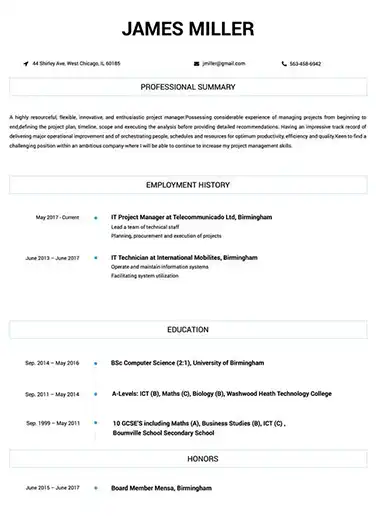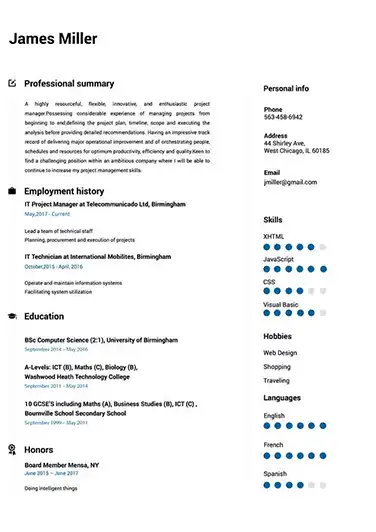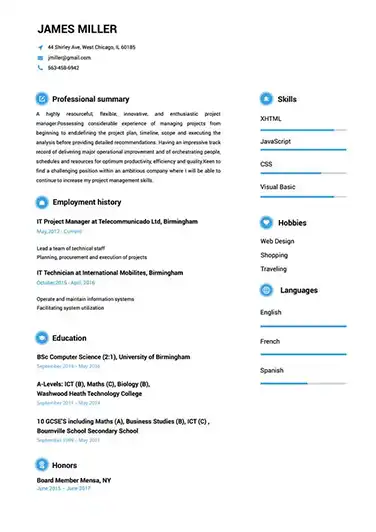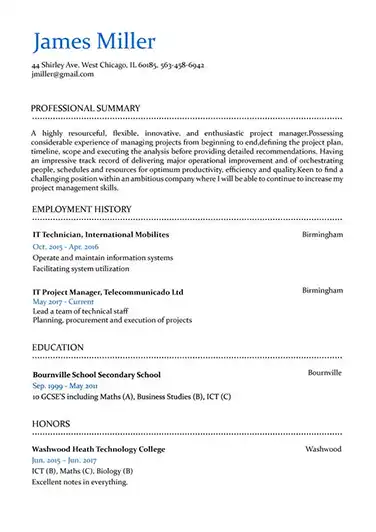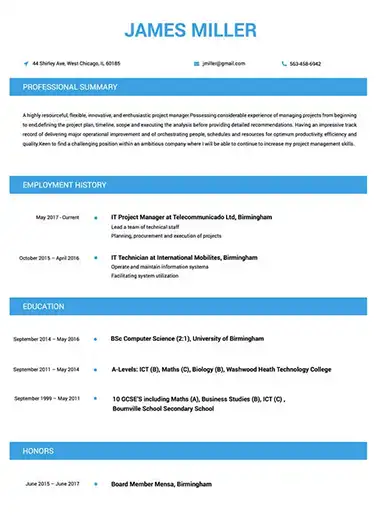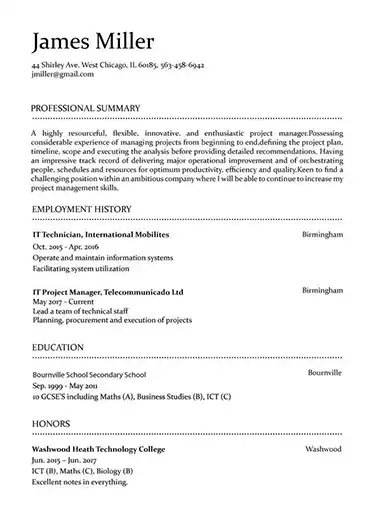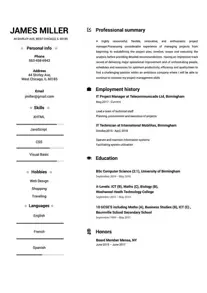 Use This Template
Use This Template
Build your resume in 15 minutes
Create an awesome resume that meets the expectations of potential employers with our selection of professional, field-tested resume templates.
devops engineer: Resume Samples & Writing Guide
yvetteanderson@zoho.com
945-757-5545
Employment history
- Develop automation scripts to reduce manual efforts
- Create and maintain system documentation
- Collaborate with development teams to ensure smooth delivery of software
- Monitor and troubleshoot production systems
- Develop and implement best practices for DevOps
- Collaborate with development teams to ensure smooth delivery of software
- Improve system performance and scalability
- Develop and maintain tools for deployment, monitoring, and operations
- Create and maintain system documentation
Education
Skills
Do you already have a resume? Use our PDF converter and edit your resume.
irvingrichard@aol.com
808-486-1283
Employment history
- Automate deployment processes
- Perform security and system hardening
- Analyze system logs and identify potential issues
- Implement and maintain CI/CD pipelines
- Automate deployment processes
- Implement and maintain containerized applications (e.g., Docker, Kubernetes)
- Manage and maintain cloud infrastructure
- Improve system performance and scalability
- Automate deployment processes
Education
Skills
fosterpaul@aol.com
625-766-4398
Employment history
- Develop and maintain tools for deployment, monitoring, and operations
- Collaborate with development teams to ensure smooth delivery of software
- Design and implement automation tools
- Implement and maintain CI/CD pipelines
- Develop and maintain tools for deployment, monitoring, and operations
- Develop and implement best practices for DevOps
- Automate deployment processes
- Monitor and troubleshoot production systems
- Perform security and system hardening
Education
Skills
davisxavier45@mail.com
806-574-1547
Employment history
- Manage and maintain cloud infrastructure
- Perform security and system hardening
- Configure and maintain version control systems
Education
Skills
irving-isaac@outlook.com
614-808-1929
Professional Summary
Employment history
- Perform security and system hardening
- Automate deployment processes
- Configure and maintain version control systems
- Implement and maintain CI/CD pipelines
- Create and maintain system documentation
- Design and implement automation tools
- Implement and maintain CI/CD pipelines
- Implement and maintain containerized applications (e.g., Docker, Kubernetes)
- Develop and implement best practices for DevOps
Education
Skills
Not in love with this template? Browse our full library of resume templates
Are you a DevOps engineer who dreams of working for the likes of Apple, IBM, Amazon, CBS, Epic Games, or Western Union?
Do we have news for you: These companies were all looking to hire DevOps engineers at the time of writing.
It’s no wonder why the demand for DevOps engineers is growing not only at big-name companies, but also at SMBs. Companies are quickly catching on to the fact that having a reliable DevOps engineer on-site is integral to facilitating effective collaboration between development and operations teams.
So what exactly is the difference between a typical software engineer and a DevOps engineer? Study.com summarizes that the biggest distinction between these two professions is their focus. While software engineers are primarily concerned with how well software suits a given client’s needs, DevOps engineers have a broader focus that encompasses “software development, how the software is deployed and providing operational support through the cloud while the software is continually functional.”
If you’re not yet a DevOps engineer but have been considering switching to this profession, you’ll be happy to hear that there’s never been a better time to get your foot in the door. As Atlassian points out, the DevOps movement is relatively new as it only started between 2007 and 2008 after, “IT operations and software development communities got vocal about what they felt was a fatal level of dysfunction in the industry.” However, it’s only been in recent years that interest in hiring DevOps has reached new heights.
Whether you’re an aspiring or experienced DevOps engineer, you’re no doubt looking for the key to finally getting hired – either for your dream job or any respectable job.
The answer is the same for both circumstances: it all comes down to your resume. Applying with a well-written, well-formatted, and engaging resume that ticks all of the boxes recruiters are looking for is the surest way to capture a recruiter’s attention. To create a resume that’s strong enough to attract more job offers than you can handle, take a read of this DevOps engineer resume examples and writing guide. You’ll discover:
- How to charm recruiters by addressing precisely what they’re after
- Expert tips for impressing during your interview
- Which qualifications you should highlight in your DevOps resume
- Which skills will get you in recruiters’ good books
- How to quickly create a job-winning DevOps resume
1. Multiple Template Examples
2. How to Write a DevOps Engineer Resume That Will Get You the Job?
How should you format your resume?
Optimally formatting your DevOps engineer resume is one of the simplest but most powerful things you can do to aid your job search. Well-formatted resumes are easier to read, skim through, and ultimately, capture a recruiter’s eye. Therein, they help to ensure your resume doesn’t drown in the sea of resumes recruiters receive for every job they post.
For this reason, it’s important not to think of formatting your resume as a secondary consideration. To be completely clear, doing so is just as vital to the success of your job application as the words that make up your resume.
So which resume format do recruiters prefer a DevOps resume to have? A reverse-chronological format. This format essentially: a) positions your professional experiences towards the top of your resume and b) arranges your professional experiences from most to least recent. In turn, a recruiter reading your resume will be left with the impression that you’re a DevOps engineer who offers an abundance of experience.
Needless to say, if you don’t have much or any DevOps experience, this isn’t the most ideal resume format for you to use. Instead, we recommend using a functional resume format, which positions your skills more prominently than your professional experiences.
As you’re tinkering around with your resume format, there are a handful of critical layout considerations that you should simultaneously keep top-of-mind. Recruiters will be looking to see if you’ve followed them, so make sure that you don’t stray from the guidelines we’ve provided below:
- Number of Pages: 1 page at most.
- Fonts to Use: Legible fonts that promote comprehension, such as Arial and Calibri.
- Fonts to Avoid: Any fonts that are used in programming or are otherwise difficult to read, such as Fira Code or Input Mono.
- Margins: 1 inch on all sides.
- Line Spacing: 1 or 1.15.
- Header size: 14-16 point size.
- Text size: 11-12 point size
What makes a great DevOps engineer resume?
There are numerous qualities that all great DevOps engineer resumes possess. To give you an insight into which ones are most critical to the success of your application, we’ve listed out 5 of the most important ones to keep in mind:
- Well-formatted: As we discussed in the previous section, correctly formatting your resume is crucial. To recap, experienced candidates should opt for a reverse-chronological format, while entry-level candidates should make use of a functional format. Great resumes also abide by standard layout guidelines, of which we’ve also listed above.
- Well-written: It may seem obvious to state, but one of the main differences that separates a good resume from a great one is the quality of writing – or lack thereof! A candidate may have all of the qualities a recruiter is looking for, but if they describe them in a lackluster way or their writing is riddled with spelling mistakes and grammatical errors, their application won’t go very far. That’s why the importance of writing your resume well cannot be overstated.
- Relevant: A resume may be considered great for one job but not for another. The reason is that a great resume highlights the most relevant qualities a candidate offers that would allow them to excel in that particular job – not every job out there. Therefore, if you want recruiters to be in awe at your resume, you need to target it to each application. To learn how to do this, make sure not to skip the next section of this guide.
- Evidence-based: If you make it to the interview stage of the recruitment process, you’ll get the opportunity to comprehensively explain all of the reasons why you believe you’re suitable for the role. However, when it comes to your resume, you’ll only have a very limited space to do so. The reason great resumes manage to be so convincing is that they provide relevant and quantifiable examples to showcase the candidates’ competencies.
- ATS-friendly: ATS, which stands for ‘Applicant Tracking System’ is a recruitment software that evaluates the suitability of your application based on the presence or absence of keywords on your resume. Keywords are words in a job ad that represent the specific skills, experiences, or qualities a recruiter is seeking from an ideal candidate.
Great resumes need to be ATS-friendly, because if they’re not, the ATS will not pass them. If you want your resume to get the tick of approval from ATS, we suggest giving this article from Muse a good read.
How to give recruiters what they’re looking for by targeting your resume to each application
As recruiters make their way through the sizable pile of resumes they’ve received, they’ll be taking note of whether each candidate has targeted their resume to align with the specific requirements of the particular job in question. Candidates who submit resumes that are customized to address such requirements will be far more likely to make it to the next round than candidates who hand in generic resumes.
It’s therefore critical to target your resume to each application if you want to get hired. After all, why would a recruiter want to pay your resume any attention if it doesn’t present you as an ideal candidate for the job?
Remember, the whole point of a resume is to convince whoever’s reading it that you offer the perfect combination of relevant hard and soft skills, professional experiences, training, certifications, educational background, and any other qualities to completely smash the job.
So how do you give recruiters what they’re looking for by targeting your resume to each application? It isn’t rocket science – you simply need to consult the job ad to identify what the recruiter is after and then touch on these qualities in your resume. Here is a handy 3-step process you can follow:
- Analyze the job ad: You can identify which qualities a recruiter is after by carefully analyzing the job ad for keywords. To refresh your memory, keywords are words that represent the very qualities a recruiter is seeking from an ideal candidate for the given role.
- Work out which ones apply to you: You should only target the keywords that are relevant to your professional profile. That’s why you need to spend the time determining which ones apply to you.
- Focus your resume around the keywords you wish to target: The final step is to focus your resume around the keywords that you wish to target. You can do this by incorporating keywords naturally throughout each section of your resume, where relevant. For example, if you identify the keyword ‘deploying cloud-based infrastructure,’ you should emphasize your skills and experiences doing so.
What are ideal DevOps job qualifications and how to list them correctly?
Each recruiter’s idea of their so-called dream candidate will change depending on the nature of each job as well as their individual preferences. That being said, there are a handful of ideal DevOps job qualifications that any recruiter would be over the moon to see on a resume. Keep reading to find out what they are, as well as how to list them correctly in your resume.
Education
In order to become a DevOps engineer, you’ll usually need to follow a specific educational path. While some workplaces may accept equivalent work experience, you will typically need to hold a Bachelor’s degree in a discipline related to computer science, electronics engineering, or mathematics.
To add your education to your DevOps resume, you’ll need to create an “Education” section. But hold up before you start recounting the good ol’ days in college, like this candidate did:
EDUCATION
- I studied at the University of California, Berkeley, for four years, from 2016 - 2020. It was a great time, especially as I was able to complete my dream degree, a Bachelor of Science (BS) in Computer Science. I enriched my mind in so many ways, so I consider it a highly fulfilling time in my life.
Recruiters only want to discover the cold hard facts about your educational background. Specifically, they want to see:
- The degree you obtained
- The educational institution you attended
- The state the educational institution is located in
- The years you studied your degree
So that you can get a clearer picture of the correct way to include your education in your resume, we rewrote the previous candidate’s “Education” section with this in mind:
EDUCATION
- Bachelor of Science (BS) in Computer Science, University of California, Berkeley, CA, 2016 - 2020
Training and Certifications
Have you completed any in-house or external training that helped to build up your skills as a DevOps engineer? Or did you study for hours and hours to pass one or more DevOps certifications? It’s a good thing you did, because recruiters love candidates who have relevant certifications or training to their name.
In terms of ideal training and certifications, many recruiters consider an AWS Certified DevOps Engineer to be the gold standard. So if you are one, you’ll definitely want to feature this fact prominently on your resume. Even if you aren’t AWS Certified, recruiters will still be very impressed to see any DevOps related certifications or training you’ve undertaken. Some examples of useful ones to feature include:
- DevSecOps Engineering (DSOE)℠ Certification
- Site Reliability Engineering (SRE) Foundation℠ Certification
- DevOps Leader (DOL)® Certification
- Certified Agile Service Manager (CASM)® Certification
- DevOps Leader (DOL)® Certification
To list any certifications or training, provide the following information about each one:
- The name of the certification or training
- The name of the institution where you received it
- The state the institution is located in
- The year you received the certification or training
For example:
- DevSecOps Engineering (DSOE)℠, DevOps Institute, FL, 2020
Which soft and hard skills should you mention? How can you do so correctly?
Every DevOps engineer has a unique skill set that distinguishes them from every other DevOps engineer out there. So which skills should you hone in on when you’re compiling your resume?
The quick answer is those that are directly relevant to the particular job you’re applying for. Remember how we explained that keywords are the secret to targeting your resume? A huge part of doing so involves incorporating skills-focused keywords into your resume.
That is, you should identify skills-focused keywords in a job ad that apply to you and then:
- Feature a few eye-catching ones in your “Resume Objective” or “Resume Summary.”
- List out 6 to 8 stand out skills in a dedicated “Skills” section.
- Incorporate the skills you mention in the above sections, as well as any other relevant skills, throughout your “Employment History” section. Ideally, every achievement should feature at least one skill.
So what types of skills-focused keywords can you expect to find in job ads for DevOps engineers? There are two types of skills you’ll come across: Soft and hard skills. To learn more about each type, keep reading. We’ve included a definition of each, as well as some typical examples that we identified by analyzing real-life DevOps job ads.
Soft skills
Soft skills are intangible skills that describe the way in which you work and interact with others. For example:
- Effective verbal and written communication skills
- Ability to work in a fast-paced environment
- Ability to grasp new concepts quickly
- Goal-oriented
- Naturally curious
- Teamwork skills
- Solution-oriented
- Proactiveness
- Adjusts quickly to changing priorities and conditions
- Willingness to work hard
Hard skills
Hard skills are tangible skills that represent technical abilities that you can draw on to successfully complete the tasks that are assigned to you. For example:
- Building, maintaining, and improving AWS infrastructure
- Providing tools that help automate engineering workflows
- Monitoring systems for health and availability
- Ensuring the companies systems are secure
- Conducting investigations into critical delivery issues
- Building, releasing, and configuration management of production and development systems
- Working with and supporting developers with their infrastructure needs
- Triaging and remediating production infrastructure, application, and database issues
- Applying knowledge of current industry trends and techniques to formulate solutions
- Reducing repetitive manual tasks performed by developers and scrum teams
In addition to the hard skills above, DevOps engineers also need to highlight their proficiency with certain operating systems, tools, cloud management platforms, and programming languages that are relevant to the given job. For example:
- Proficiency with developing in specific operating systems (e.g. Linux, Windows, etc)
- Proficiency with specific tools (e.g. Kubernetes, GitHub, Docker, Jenkins, SonarQube, Chef, Selenium, etc)
- Proficiency with specific cloud management platforms (e.g. IBM Cloud, Microsoft Azure, Amazon AWS, etc)
- Proficiency with specific programming languages (e.g. PHP, Python, Java, etc)
How to write a resume objective or summary and examples of both
A “Resume Objective” and “Resume Summary” both serve as an introductory section in a resume. The best ones manage to convey what an amazing hire a candidate would be in just 2 to 4 sentences.
So what’s the difference between them? A “Resume Objective” is designed for entry-level candidates looking to get their start as a DevOps engineer. In contrast, a “Resume Summary” is reserved for use by experienced candidates who want to stand out from other experienced candidates. You can learn more about how to expertly craft the one that’s appropriate to your circumstances below:
Resume objective
We recommend all entry-level and aspiring DevOps engineers to include a resume objective because it’s the easiest way to convince a recruiter from the get-go that you have undeniable potential to excel in a given role.
To develop an understanding of how to write an excellent resume objective, it’s useful to learn what not to do first. To that end, take a look at this not-so-convincing example of a DevOps resume objective:
- I am after an opportunity to kick off my career as a DevOps engineer, and I believe that this role is an ideal place to start. While I currently have zero experience in this field, my experience as a software developer makes me a naturally strong hire. I already have most of the skills a DevOps engineer needs, so I would only require minimal guidance to polish these skills.
This example is representative of how many entry-level candidates write their resume objectives. On the whole, both the tone and content comes across as highly unprofessional. This was of course not the candidate’s intention, but it’s very easy to make mistakes with your resume objective if you don’t know what standard to aim for.
So what exactly about this resume objective screams “amateur?” The candidate attempts to establish themselves as a “naturally strong hire”, but doesn’t provide a skerrick of evidence to support their claim. For example, they claim to have “most of the skills a DevOps engineer needs,” but then fail to specify even a single relevant skill they offer. They also leave the impression that they want the role to further their own goals, rather than to help those of the company at hand.
Now that you have a firm idea of what to avoid, let’s take a look at an example of a brilliant DevOps resume objective:
- Aspiring DevOps engineer with 5 years of experience as a software developer, including 2 years as a manager. As a Junior DevOps Engineer at Hexagon Solutions, I plan to draw on my experience triaging and remediating production infrastructure and proficiency with developing in Linux. My strong communication and analytical thinking skills would also ensure I excel in this role.
Any recruiter would agree that this candidate paints a far more compelling picture of themselves as a future DevOps engineer than the previous candidate. As an entry-level candidate, your goal should be to reduce any doubts a recruiter has about your application.
This candidate does this by not only showcasing their relevant hard skills (triaging and remediating production infrastructure and developing in Linux), but also their relevant soft skills (communication and analytical thinking skills). This is notable because many aspiring candidates forget that soft skills are just as important to bring to the table as hard skills.
The candidate also reassures the recruiter that they’re ready to take the leap to this new job by emphasizing their relevant professional experiences as a software developer and manager.
Resume summary
The key to writing a strong resume summary is to figure out which of your qualities a recruiter will be most interested to learn about. Above all else, you should emphasize your experience and skills as a DevOps engineer. After all, your primary aim is to persuade them that these qualities make you a shoo-in for the role.
That’s why it’s vital to convey what a professional you are. The last thing you want to do is miss the chance to impress, like this candidate did:
- Experienced DevOps engineer who is looking to start a new role where my strong skill set and professional experience will be genuinely valued. I previously interviewed at Google, so I know that I am an in-demand candidate. If you are looking for an amazing DevOps engineer, keep reading to discover more about my impressive professional profile.
The reason this resume summary would leave a sour taste in a recruiter’s mouth is that it makes the candidate seem like they’re all talk. Notice how the candidate vaguely states that they have many attributes that make them “an amazing DevOps engineer,” but then doesn’t offer any clear examples of their supposed attributes.
The fact that they mentioned their interview at Google would also rub a recruiter up the wrong way. After all, a recruiter wants to know why you would be a perfect fit at the company they’re hiring for, not anywhere else!
So what does a fantastic resume summary look like? Take a look for yourself:
- Goal-oriented DevOps engineer with 5 years of experience who wishes to apply their superior skills building, maintaining, and improving AWS infrastructure at Silver Spoon Enterprises. With a history of resolving complex technical problems, including one which saved my current company over $30K, I also offer proven problem-solving skills as well as Kubernetes and Python expertise.
This resume summary looks a million times better than the previous one, right? There are numerous reasons for this, but let’s highlight the major ones. The candidate expertly sells themselves as a highly-experienced DevOps engineer who has the right mix of skills and competences to excel in the given role.
They do this by emphasizing their hard skills (building, maintaining, and improving AWS infrastructure, resolving complex technical problems, as well as Kubernetes and Python expertise) and soft skills (goal-oriented approach and problem-solving skills). These aren’t just any skills, either; they’re the precise ones the candidate identified in the job ad.
Another noteworthy thing about this resume summary is that it features an eye-grabbing achievement that quantifies the candidate’s skills (the $30K the candidate saved their company). If you can create a similarly well-written resume summary, we have every confidence that recruiters will be lining up to interview you!
How do you make your resume stand out?
While the increasing demand for DevOps engineers is certainly favorable news for you, keep in mind that this demand is coupled with greater competition. As such, it’s integral to make the extra effort to distinguish your resume from the pack. Here are some quick ‘n easy tips for doing so:
- Include a resume header: This one-line, eye-catching summary of who you are as a professional can capture a recruiter’s attention instantly.
- Don’t list duties, list achievements: A surefire way to send a recruiter to sleep is to list the job duties you completed in your “Employment History” section. Instead, phrase them as achievements that showcase how much value you brought to the given company.
- Mention relevant open source projects you’ve contributed to: The fact that you’ve done so shows that you’re active within the engineering community, which is considered a major plus by recruiters. To learn how to do so properly, we suggest taking a read of Open Source’s article on the topic.
- Ensure your resume is 100% free of spelling and grammatical errors: Recruiters can’t stand seeing spelling and grammatical errors in resumes. Some ideas for detecting errors include running a spell check, using Grammarly, and asking someone else to read through your resume.
How to prepare for a job interview as a DevOps engineer?
If you have one or more DevOp interviews locked in, congratulations! This means that your application left a strong impression on the right people. So how do you ensure that your interview further solidifies the fact that you’re the very best candidate for the job? It all comes down to careful and strategic preparation. Here are our experts’ top tips for preparing a job interview as a DevOps engineer:
- Be prepared to talk the talk: In order to answer any questions an interviewer throws at you with ease and confidence, you will need to put in hours of interview prep. One of the most effective methods is to practice your answers to common interview questions.
We’ve listed out 30+ common questions in the next section that cover not only your professional experiences, skills, and qualities, but also your general DevOps knowledge. Also included are commonly asked questions about the company and position. Keep in mind that to prove that you really want a given job, you’ll need to show that you’ve done your research about the company and position.
- Engage in technical interview practice: The interview prep doesn’t end there. You also need to prepare to ace any technical questions you’re asked. Whether you get asked just a handful of technical questions or need to engage in a more extensive technically-focused interview, you won’t want to miss a beat. You should brush up not only on your coding, definitions,
Fortunately, there are tons of innovative online resources to help you prepare for your DevOps interview. For example, Code Signal allows you to complete real-world assessments in an advanced IDE, while Pramp will pair you with an optimal peer to hone your interview answers.
- Get your clothes in order: As a general rule of thumb, you should always dress to impress as an interviewee. While the company you’re interviewing with may indeed allow its employees to wear anything short of a shower curtain, remember that you’re not yet working there. Interviewers expect interviewees to be neat and professionally dressed. Anything short of that may in fact cost you the job.
So what exactly should you wear? Susan Hosage, Senior Human Resources Manager recommends that men wear a sports coat, dress shirt, and khakis and women wear a straight/A-line skirt, dress pants, blouse or sweater, and jacket. Make sure to get all of your clothes in order well before your interview so that you don’t end up scrambling to find this and that item. And don’t forget to iron your clothes!
Pro tip: Don’t forget to plan how you’re getting to the interview. Working out your route and in advance will ensure that you get to your interview on time. It’s considered best practice to arrive around 10 minutes early. Be sure to factor in additional time on your journey so that you’ll still be able to arrive on time should any unexpected obstacles crop up.
Which questions are likely to be asked during the interview process?
As we explored above, preparation is key to impressing during your interview. Knowing which types of questions are likely to be asked during the interview process before the fact will allow you to refine your answers and reduce the chances of being caught out. Below, we’ve shared some of the most common questions candidates can expect to be asked at DevOps interviews:
About Your Professional Experiences, Skills, and Qualities
- Can you give a brief overview of your work history to date?
- Why do you think we should consider you for the role?
- Describe yourself in three words.
- What about the position interested you most?
- What qualities do you believe make you stand out as a DevOps engineer?
- Why do you think you’ll be a good DevOps engineer even though you have no experience?
- Why do you want to change jobs?
- What are your pet peeves?
- How would you describe your communication style?
- How would your previous colleagues describe you?
- What is your proudest professional achievement to date?
- What do you need to improve?
- Describe a time when you encountered conflict within the workplace.
About Your DevOps Knowledge
- How would you describe DevOps to someone with no knowledge of it?
- What are some key DevOps KPIs?
- Can you name the different phases in DevOps?
- What are the main advantages and disadvantages of DevOps?
- What is the purpose of CI?
- Which DevOps tools do you believe are most valuable?
- What is the difference between git fetch and git pull?
- Describe how you would resolve a merge conflict in Git.
- Which commands can you use to restart Jenkins manually?
- Can you explain virtualization with Nagios?
- What is a virtual private cloud?
- Do you believe more companies should promote a DevOps work culture? If so, why?
- What are the primary challenges DevOps engineers face when fostering collaboration?
About the Company / Position
- Why do you want to work here?
- What do you think our company does better than our competitors?
- What do you know about our company?
- Which areas do you think we could improve on?
- Who is our typical customer?
- When were we founded
- Who are our biggest competitors?
3. How to Make a Superb DevOps Engineer Resume Using Resumebuild.com’s Resume Builder Tool
Remember how we said that top-tier companies are actively looking for DevOps engineers? These companies – and all companies for that matter – aren’t willing to hire an entry-level or experienced DevOps engineer unless they know that they’re completely committed to the job.
If you’re lacking the time or motivation to get your resume in order but still want to impress recruiters, you’ll be glad to hear that there’s an easier way to make a superb DevOps engineer resume. We’re referring to none other than our feature-packed resume builder at Resumebuild.com.
Our resume builder is so easy and effective to use that you can even make an impressive resume in only a couple of minutes! Wondering how this can even be possible? For starters, our resume builder will completely handle all of the time-consuming formatting and layout considerations you’d usually need to configure on your own. It does this by offering you a variety of HR-aligned resume templates to choose from and make use of.
You also won’t need to waste hours upon hours trying to figure out what information should go in which section. Instead, you can follow our resume builder’s clear step-by-step resume making process. We’ve included a plethora of inspiring pre-written examples throughout the builder, so you won’t need to rack your brains in order to make the perfect resume.
If you want to show recruiters what they’ve been missing out on, create a brilliant DevOps resume at Resumebuild.com.
devops engineer Job Descriptions; Explained
If you're applying for an devops engineer position, it's important to tailor your resume to the specific job requirements in order to differentiate yourself from other candidates. Including accurate and relevant information that directly aligns with the job description can greatly increase your chances of securing an interview with potential employers.
When crafting your resume, be sure to use action verbs and a clear, concise format to highlight your relevant skills and experience. Remember, the job description is your first opportunity to make an impression on recruiters, so pay close attention to the details and make sure you're presenting yourself in the best possible light.
devops engineer
- take care of application deployments.
- to ensure minimum infrastructure cost on AWS.
- configuring backup policies for services running on AWS.
- writing CI/CD pipelines on Jenkins.
- implementation of monitoring paltform to monitor Application and services running on AWS.
devops engineer
- Created a machine learning pipeline for training and deployment of machine learning models using AWS, Sacred, Jenkins, Apache Mesos, Docker and Django.
- Set up a new HBASE Cluster using Cloudera and properly configure it to give optimal performance.
- Wrote Puppet manifests and modules to deploy, manage and configure servers
- Built and deployed docker containers to increase scalability and consistency of an application.
- Orchestrating workflows with Docker, Jenkins and Mesos.
senior devops engineer
- Designing and developing continuous Integration/Delivery Pipeline using Jenkins and groovy script.
- Reduced deployment time by a factor of 15 (from three weeks to one day) with Ansible tower and Ansible playbooks.
- Experience in creating Docker Containers leveraging existing Linux Containers and AMI’s in addition to creating Docker Containers from scratch.
- Supporting and working alongside Agile development teams to ensure they have all the facilities to get the job done
- Maintaining services hosted on AWS, managing EC2 instances, Auto Scaling groups, EBS , ELB, S3, Route53, IAM and API Gateway.
- Designing and creating API and Lambda functions in AWS using serverless framework
- Streamlined applications delivery to get applications out to customers faster.
devops engineer
- Working in implementation team to build and engineer servers for Red hat Linux operating systems. Working on AWS to provision newinstances. S3 Storage Services. AWS EC2 & Cloud watch services. CI/CD pipeline management through Jenkins.
- Creating customize Docker images for test and production environment to store in Private Docker registry.
- Used Jenkins to automate most of the build related tasks.
- Developing pom.xml files for Maven build scripts.
- Wrote shell script to Automate database related task.
- Using Multi-Factor Authentication (MFA) in AWS.
- Configuring of IAM user policy as per user needed.
devops engineer
- VPCs. All the projects are deployed in their own VPC. There are dedicated VPCs for every stage of the project. Inside a VPC, ACLs and Route Tables are used to define isolated ‘scopes’. For example, the RDS instances are only accessible from specific subnets in the VPC.
- Define and implement procedures for monitoring, alerting, autoscaling, backup logging.
- Automated the environment brings up using AWS CloudFormation and AutoScaling automated scripts.
- Done daily health check of the system and provided support to the end-user.
- Troubleshooting of various services on Amazon EC2 instances and ELB.
- Setup MongoDB Replica Set.
- Centralized logging system. Based on using TD-AGENT, Log Stash, Elastic search and Kibana.
devops engineer Job Skills
For an devops engineer position, your job skills are a key factor in demonstrating your value to the company and showing recruiters that you're the ight fit for the role. It's important to be specific when highlighting your skills and ensure that they are directly aligned with the job requirements, as this can greatly improve your chances of being hired. By showcasing your relevant skills and experience, you can make a compelling case for why you're the best candidate for the job.
How to include technical skills in your resume:
Technical skills are a set of specialized abilities and knowledge required to perform a particular job
effectively. Some examples of technical skills are data analysis, project management, software proficiency,
and programming languages, to name a few.
Add the technical skills that will get hired in your career
field with our simple-to-use resume builder. Select your desired resume template, once you reach the skills
section of the builder, manually write in the skill or simply click on "Add more skills". This will
automatically generate the best skills for your career field, choose your skill level, and hit "Save &
Next."
- Cloud Computing
- Linux Administration
- Automation
- Scripting
- Docker
- Kubernetes
- Containers
- CI/CD
- Ansible
- Puppet
- Bash
- Python
- Java
- AWS
- Azure
- GCP
- Terraform
- Git
- Networking
- Security
How to include soft skills in your resume:
Soft skills are non-technical skills that relate to how you work and that can be used in any job. Including
soft skills such as time management, creative thinking, teamwork, and conflict resolution demonstrate your
problem-solving abilities and show that you navigate challenges and changes in the workplace
efficiently.
Add competitive soft skills to make your resume stand-out to recruiters! Simply select
your preferred resume template in the skills section, enter the skills manually or use the "Add more skills"
option. Our resume builder will generate the most relevant soft skills for your career path. Choose your
proficiency level for each skill, and then click "Save & Next" to proceed to the next section.
- Communication
- Interpersonal
- Leadership
- Time Management
- Problem Solving
- Decision Making
- Critical Thinking
- Creativity
- Adaptability
- Teamwork
- Organization
- Planning
- Public Speaking
- Negotiation
- Conflict Resolution
- Research
- Analytical
- Attention to Detail
- Self-Motivation
- Stress Management
- Collaboration
- Coaching
- Mentoring
- Listening
- Networking
- Strategic Thinking
- Negotiation
- Emotional Intelligence
- Adaptability
- Flexibility
- Reliability
- Professionalism
- Computer Literacy
- Technical
- Data Analysis
- Project Management
- Customer Service
- Presentation
- Written Communication
- Social Media
- Troubleshooting
- Quality Assurance
- Collaboration
- Supervisory
- Risk Management
- Database Management
- Training
- Innovation
- Documentation
- Accounting
- Financial Management
- Visualization
- Reporting
- Business Acumen
- Process Improvement
- Documentation
- Relationship Management.
How to Improve Your devops engineer Resume
Navigating resume pitfalls can mean the difference between landing an interview or not. Missing job descriptions or unexplained work history gaps can cause recruiters to hesitate. Let's not even talk about the impact of bad grammar, and forgetting your contact info could leave your potential employer hanging. Aim to be comprehensive, concise, and accurate.
Employment history
- Collaborate with development teams to ensure smooth delivery of software
- Develop and implement best practices for DevOps
- Develop automation scripts to reduce manual efforts
- Implement and maintain containerized applications (e.g., Docker, Kubernetes)
- Design and implement automation tools
- Improve system performance and scalability
- Implement and maintain containerized applications (e.g., Docker, Kubernetes)
- Develop and maintain tools for deployment, monitoring, and operations
- Analyze system logs and identify potential issues
Education
Skills
Provide your Contact Information and Address Year Gaps
Always explain any gaps in your work history to your advantage.
Key Insights- Employers want to know what you've accomplished, so make sure to explain any gaps using a professional summary.
- Adding extra details and context to explain why you have a gap in your work history shows employers you are a good fit for the position.
How to Optimize Your devops engineer Resume
Keep an eye out for these resume traps. Neglecting to detail your job roles or explain gaps in your career can lead to unnecessary doubts. Grammar blunders can reflect negatively on you, and without contact information, how can employers reach you? Be meticulous and complete.
vaughn.barry@protonmail.com
697-125-7472
Employment history
- Colaborate wit development teams too ensue smoth delivery of softwere.
- Analize system loggs and idetify potencial issuse.
- Perform security an system hardening.
- Cratee and maintan system documentaton.
- Develp, an' maintain tools fer deployment, monitorin', an' operations.
- Perform security and system hardeninging
Education
Skills
Include Job Descriptions and Avoid Bad Grammar
Avoid sending a wrong first impression by proofreading your resume.
Key Insights- Spelling and typos are the most common mistakes recruiters see in resumes and by simply avoiding them you can move ahead on the hiring process.
- Before submitting your resume, double check to avoid typos.
devops engineer Cover Letter Example
A cover letter can be a valuable addition to your job application when applying for an devops engineer position. Cover letters provide a concise summary of your qualifications, skills, and experience, also it also gives you an opportunity to explain why you're the best fit for the job. Crafting a cover letter that showcases your relevant experience and enthusiasm for the Accounts Payable role can significantly improve your chances of securing an interview.
Anderson yvetteanderson@zoho.com
945-757-5545
401 Cherry St., Roaring Springs, TX
79256
Tesla Motors
Palo Alto, California
To the Recruitment Team at Tesla Motors
I am excited to apply for the Senior Devops Engineer position at Tesla Motors. As a highly skilled Devops Engineer with 10 years of experience in Engineering, I am confident that I can contribute significantly to your organization.
Growing up, I always had a fascination with Structural Engineering. As I pursued my education and gained experience in this field, I realized that this was where I could make the most impact. I have had the opportunity to work on things throughout my career like personal projects and voluntary work, which have developed in me a deep understanding of the challenges and opportunities in this field. I am excited to bring my passion and expertise to the role at and help your organization achieve its goals.
Thank you for considering my application for the Senior Devops Engineer position. With my skills and the amazing team at this organization, I am assured that I can contribute to your organization's success and make a meaningful impact. Looking forward to a future where we can work together.
With gratitude,
Yvette Anderson
945-757-5545
yvetteanderson@zoho.com
Yvette Anderson
Showcase your most significant accomplishments and qualifications with this cover
letter.
Personalize this cover letter in just few minutes with our user-friendly tool!
Related Resumes & Cover Letters

Build your Resume in 15 minutes
Create an awesome resume that meets the expectations of potential employers with our selection of professional, field-tested resume templates.

